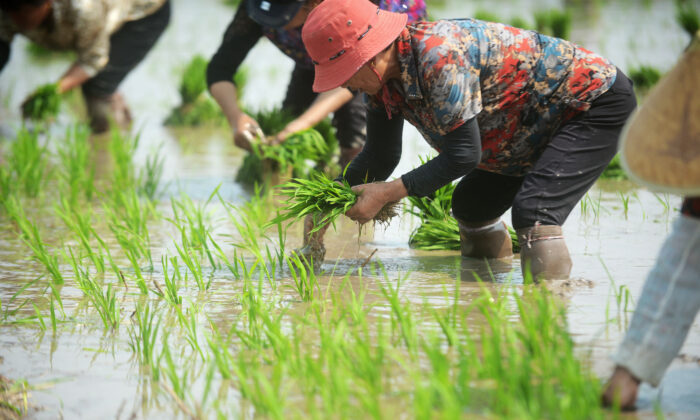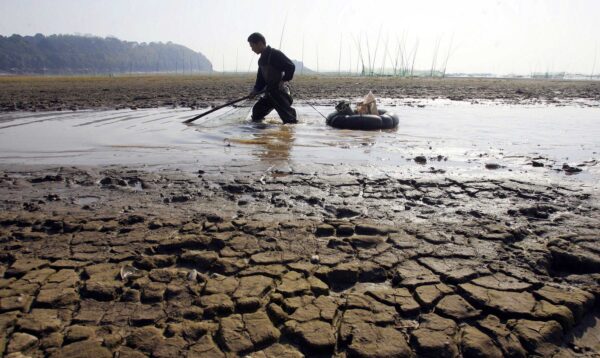Right now Chinese food stocks are surely in sharp decline thanks to the disasterous flood season this year.
So it is time for plenty of political Jaw Jaw to help handle the potential for revolution..
That is the real crisis of hte moment. however the sentiments are good and have produce results also.
Farmers work in the fields in Yangzhou, China, on June 6, 2018. (VCG/VCG via Getty Images)
Chinese Regime Relies on Farming, Drains Assets of Private Entrepreneurs to Sustain Economy
November 30, 2020 Updated: December 2, 2020
https://www.theepochtimes.com/chinese-regime-relies-on-farming-and-drains-assets-of-private-entrepreneurs-to-sustain-economy_3599269.html
Commentary
Beijing’s mouthpiece Xinhua News Agency reported on Nov. 16 that Xi Jinping completed his inspection tour of Jiangsu Province. The article laid out the Chinese regime’s latest economic policies—relying on farming and exploiting private entrepreneurs for its so-called domestic market as the mainstay.
The article had a grandiose headline: “High-quality and sustainable, it is about our happy future! General Secretary Xi Jinping visited Jiangsu to encourage all regions to accelerate the construction of a new development pattern.”
The title suggests that Xi had some clever plan for putting resources into action. But Xinhua’s summary of “ecological civilization” and “those who get rich first can help the next person to become rich” is nothing new.
‘Investment in the Ecosystem’
Xinhua quoted Xi as saying, “Investment in the ecosystem is not unnecessary or invalid, it is fundamental and a strategic investment for high-quality and sustainable development of the social economy.”
To better explain this broad statement, Xinhua used the example of how Yigao village in Zhejiang Province “cleaned and restored about 12 miles (18.9 kilometers) of its rivers.”
Zhong Liang, Party secretary of Yigao told Xinhua: “Water is the highlight of the villages in the Lake Taihu area, but its environmental governance is difficult. As the environment continues to improve, the village’s tourism industry is growing rapidly. We are realizing the domestic economy through ‘investment in the ecosystem.’”
Xinhua also quoted Ma Xiaohui, Party secretary of Huzhou city in Zhejiang, “Accelerate the green transformation of manufacturing, the cultivation of service industry innovation, and the efficient improvement of modern agriculture.”
The so-called green manufacturing and innovative service industry are merely political slogans with no concrete meaning. In the end, it’s all about sustaining agriculture. The article’s interpretation of “investment in the ecosystem” turns out to be farming.
Domestic Market Has Reverted to Farming
Xi said during the tour in Jiangsu: “The stable economic development and structurally optimized Yangtze River Economic Belt has significantly improved the livelihood (in the area). It has realized a mutual alliance between environmental protection and development.”
Xinhua gave an example to explain Xi’s remark. In Changshui village, Jiangxi Province, the locals run guest houses and rely on tourism agriculture.
“The total value of agricultural products is 2.73 times the GDP, farmers share dividends with green water and green mountains, and a mountain is valued at 2 billion yuan (about $304.1 million) … in Jiangxi, good mountains and water are beginning to ‘sell’ at a good price,” the report stated.
According to Xinhua, China’s economy has gone back to relying on traditional agriculture and environmental protection for local tourism development. Of course, the “green” slogan has to carry on.
Xinhua said: “In recent years, Jiujiang has rejected more than 400 investment projects that could negatively impact the ecological environment. As many as 53 sewage outlets above the designated size were fully monitored. Small chemical companies within 1 kilometer of the river will be classified and shut down and relocated, leaving room for the development of emerging industries led by the port and digital economies and gradually promoting eco-industrial development.”
The slogan-filled eco-industrial development plan has exploited environmental protection without concrete evidence and didn’t mention a new development pattern. For instance, the enforcement of fishing ban policies along the Yangtze River came into effect on Oct. 1 and will last for 10 years. How is the port economy going to sustain itself and where is the capital to support a digital economy? Without actual consumption, it is difficult to truly realize a digital economy.
A fisherman net fishing at the quickly drying up Dongting Lake in Hunan Province, China, on Jan. 11, 2007. Dongting Lake, China’s second-largest freshwater lake, is a flood basin of the Yangtze River and is facing an ecological crisis. (China Photos/Getty Images)
In the end, it seems agriculture is the only way to support the domestic market.
Private Entrepreneurs Could Become Victims
With very little to sell in a so-called ecological civilization, Xinhua continued quoting Xi, “After private entrepreneurs get rich, they should do their best to contribute their ability to help those who are in need by strengthening their affections for the nation, assuming their social responsibility, and joining public affairs.”
Again, Xinhua used an example to explain Xi’s strategy. Shanquan village in Jiangsu Province once owed 47 million yuan (about $7.1 million), but things changed due to the leadership of private entrepreneurs in the village.
The article didn’t give details about how the change took place, but only mentioned that more employment opportunities were provided. Xinhua also claimed that Nantong city of Jiangsu “enjoys a large private economy, which accounts for 70 percent of the city’s total economy, 80 percent of taxes, and 90 percent of employment.”
These examples show that Jiangsu’s economic development mainly depends on private entrepreneurs. However, the article quoted Cao Haifeng, secretary of the Party group and director of the Nantong Municipal Bureau of Industry and Information Technology, “It is not only necessary to develop the economy and develop enterprises,” but also to “advocate entrepreneurs to share social responsibility and serve the country.”
Private entrepreneurs would be alarmed by this. If Jack Ma (founder of Alibaba) and Ma Huateng (founder of Tencent), who have strong political connections, had to hand over their assets to the regime, then how can ordinary small-business owners avoid being drained by the Chinese Communist Party (CCP) officials?
Private enterprises are the real driving force behind China’s economic development. Economically draining entrepreneurs of their wealth has unfortunately become part of the CCP’s domestic market policy.
Xinhua exposed the reality that the only thing China’s economy is left with are the slogans “ecological civilization” and the cruel “draining private entrepreneurs.” Xi’s remarks gave the best explanation, “In the overall development of the country, we should clarify our position for self-development and explore effective ways to promote a smooth domestic cycle.”
Xinhua’s lengthy article gave no clue about the so-called domestic economy and high-quality development. It looks like the CCP’s slogan-based economic development is coming to an end.


No comments:
Post a Comment